| Srl | Item |
| 1 |
ID:
113049
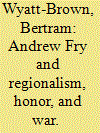

|
|
|
| 2 |
ID:
113056
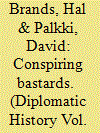

|
|
|
|
|
| Publication |
2012.
|
| Summary/Abstract |
This article uses captured Iraqi regime records to trace Saddam Hussein's strategic view of the United States from the time of his political ascendancy in the 1970s to his invasion of Kuwait in 1990. What is remarkable about Saddam's view of the United States is how consistently and virulently hostile it was. From early on, Saddam believed that the United States was unalterably opposed to his Baathist project and that Washington was seeking to marginalize and weaken Iraq. These sentiments were rooted in Baathist ideology and the key personality traits that shaped Saddam's worldview, but they were repeatedly reinforced by Washington's policies in the Middle East. Tacit U.S. support for Baghdad during the Iran-Iraq war aided Saddam's war effort but did little to ameliorate his fears. By the late 1980s and 1990, Saddam worried that American operatives were trying to assassinate him, and he saw the United States (and its ally, Israel) as the foreign powers most dangerous to his regime. This view of U.S. policy, in turn, seems to have had an important influence on Saddam's decision to invade Kuwait.
|
|
|
|
|
|
|
|
|
|
|
|
|
|
|
|
| 3 |
ID:
113048
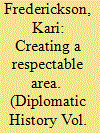

|
|
|
| 4 |
ID:
113055


|
|
|
|
|
| Publication |
2012.
|
| Summary/Abstract |
Fast track procedures have been key institutional mechanisms for U.S. trade policy making for nearly three decades. In April 2008, the U.S. House of Representatives made a small change to rules for considering the U.S.-Colombia Free Trade Agreement that significantly undermined fast track. However, these actions are really the culmination of the erosion of the utility of fast track in managing U.S. trade policy in the context of the challenges brought by increased openness in the global economy. Those challenges were laid bare with the first major bilateral agreement considered under fast track rules, the Canada-U.S. Free Trade Agreement in the late 1980s.
|
|
|
|
|
|
|
|
|
|
|
|
|
|
|
|
| 5 |
ID:
113052


|
|
|
| 6 |
ID:
113051
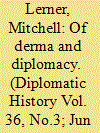

|
|
|
| 7 |
ID:
113046
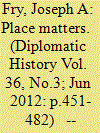

|
|
|
|
|
| Publication |
2012.
|
| Summary/Abstract |
Place matters in how Americans and their political representative have responded to U.S foreign relations. Domestic regionalism has exercised a persistent and at times primary influence on the formulation of U.S. foreign policy. Through a selective historiographical review of the literature addressing New England, the Midwest, and the South, this article urges scholars to recognize this important domestic influence on policy formation-an influence that affords the opportunity to assess ideological, racial, religious, economic, and political considerations in a useful collective fashion.
|
|
|
|
|
|
|
|
|
|
|
|
|
|
|
|
| 8 |
ID:
113050


|
|
|
| 9 |
ID:
113053
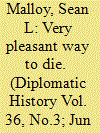

|
|
|
|
|
| Publication |
2012.
|
| Summary/Abstract |
One of the distinguishing characteristics of the atomic bombs used against Hiroshima and Nagasaki was their accompanying radiation effects. The effects of ionizing radiation on the bomb's survivors have been the subject of intense study and discussion since August 1945. This article examines a related question that has received surprisingly little scholarly attention: what did American scientists and policy makers know about radiation effects prior to the use of the bomb? In making the decision, did American leaders understand that the atomic bombs used against Japanese cities and civilians would have lingering and deadly effects in some ways analogous to chemical or biological weapons?
A careful study of pre-Hiroshima knowledge of radiation effects in the United States makes it clear that most of the immediate and long term biological effects of radiation on the victims of the bomb were, in fact, predictable at the time of the A-bomb decision. While the pre-Hiroshima understanding of radiation among Manhattan Project scientists was far from perfect, that the bomb would produce lingering and lethal effects was suggested as early as 1940. Extensive research carried out by Manhattan Project scientists and physicians during World War II, including both human and animal experiments, greatly expanded knowledge of the biological effects of ionizing radiation.
Despite the intense wartime study of radiation effects in the United States, this knowledge played little or no role in the decision to use the atomic bomb. The policy of compartmentalization and secrecy enforced by Manhattan Project director General Leslie R. Groves, combined with the single-minded drive at Los Alamos to build a working bomb, meant that few even inside the Manhattan Project itself were aware of, or interested in, the emerging body of knowledge on radiation effects generated during the war. The high-level American leaders who made the final decisions about the bomb, including President Harry S. Truman, Secretary of State James F. Byrnes, and Secretary of War Henry L. Stimson, were never informed that the weapon would continue to sicken and kill its victims long after use.
For all of the outstanding technical successes of the Manhattan Project, the policy of wartime compartmentalization and postwar denial with respect to radiation effects ultimately served neither American leaders nor the many victims of the bomb in Japan. In addition to analyzing the evidence of pre-Hiroshima knowledge of radiation effects in the United States, this article explores the disconnect between scientific knowledge and political decision making with respect to the atomic bomb that would continue into the Cold War.
|
|
|
|
|
|
|
|
|
|
|
|
|
|
|
|
| 10 |
ID:
113054


|
|
|
|
|
| Publication |
2012.
|
| Summary/Abstract |
This paper explores Hanoi's diplomatic strategy during the early stage of the so-called Vietnam War. It draws from Vietnamese, Western, and other materials to elucidate the meanings and usages Hanoi attached to diplomacy in those years, to describe the related maneuverings of North Vietnamese leaders, and to identify the forces shaping those maneuvers. Following the onset of war Hanoi rejected negotiations with Washington, but that did not mean that the so-called "diplomatic struggle" was non-existent, or unimportant. State and party organs used diplomacy to manipulate and mobilize world opinion, to mitigate the effects of the Sino-Soviet dispute, and to secure necessary material assistance from socialist allies to sustain the war until "final victory" over the United States. Diplomacy thus served as a veritable instrument of war for Hanoi. Admittedly, diplomatic priorities changed over time, but diplomatic struggle itself remained at the heart of its "Anti-American Resistance."
|
|
|
|
|
|
|
|
|
|
|
|
|
|
|
|
| 11 |
ID:
113047


|
|
|